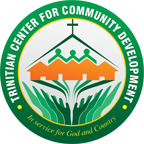TRINITIAN CENTER FOR COMMUNITY DEVELOPMENT

The Trinitian Center for Community Development is the official arm for Community Extension Service that supports Trinity University of Asia in carrying out its Vision and Mission of involving her constituents to live a LIFE that is GOD-centered and in service to the community. Specifically, the Center facilitates in assisting the community to nurture individuals become responsible, competent, and productive. It works towards achieving the Mission of: quality instruction, productive research, and genuine voluntary involvement in community service.
_________________
TCCD Then and Now…
The outreach program of Trinity College (now Trinity University of Asia) started with humble beginnings. It started in 1977when the College of Nursing started with a medical clinic offering, the basic health services with the assistance of some doctors from St. Luke’s Hospital in Barangay Damayang Lagi, Quezon City. The health program moved to Barangay Tatalon and then to Barangay Kalusugan later but the University maintained its services to other Barangays that needed medical assistance.
In 1978, the then Barangay Chairmen of Tatalon, Damayang Lagi, Imelda, Mariana, Kalusugan and Roxas met with the late Dr. Arturo M. Guerero, then the President of Trinity College and expressed the need for a training program in basic skills that will enable many of the school dropouts and unemployed residents of the surrounding communities to learn skill for employment. This started the Skills Training Enablement Program (STEP) in 1978 by the High School department.
1982, the College of Education responded to the call as a relevant institution for a formal education for children in the nearby-depressed areas through Community Outreach for Pre-school Education (COPE) in Tatalon. Between 1981 and 1982the programs of the different units were consolidated, Project CAUSE (Community Allied Urban Services and Education) or TCCD serves as the mother unit of other outreach programs and services of Trinity College.
In 1995, the Japan Government and other private citizens of Japanmade possible the construction of a two-storey building which serves as the center for different community outreach programs. It used to have CAUSE as its name but it has been renamed Trinitian Center for Community development (TCCD), a move towards continuing relationship and partnership between Trinity College, the urban and rural communities.
PHILOSOPHY
The TCCD philosophy adheres to the University’s vision of preparing students to life that is Christ-centered gearing towards leading the society to change and development that is humane and sustained for all generations.
FAITH – CDI– Framing an Active, Inclusive, Transformative and Humane Community Development Initiative. This envisions the proactive engagement of the stakeholders in the community in the assessment, planning and implementation of programs and services in their respective areas as facilitated by the University’s faculty and students wherein both parties are learning in the process of development. This may be achieved through the following:
- The achievement of the goals and objectives of the of the programs of the community development section is its evident impact on the lives of the people of its partner communities
- The measure of effectiveness of the community extension program is the achievement of its objective and its desirable outcome that is based on people’s perspective
- The extension program shall be research-based and is responsive to the actual needs and resources of its partner communities matched with the expertise of the different Colleges to ensure sustainable, integrative and transformative development.
GOALS
- Expand and sustain service-learning programs to the community through intensifying volunteerism among students and faculty;
- Share unselfishly skills and expertise in nurturing others for self-development; and
- Establish harmonious working relationship and linkage with the community, government, and private institutions for socio-economic development.
OBJECTIVES
- Encourage volunteers to community outreach projects and activities geared to cultivate and heighten spiritual nurturance, education, health, social awareness and concerns, among community project holders and recipients.
- Coordinate and monitor the different volunteer development and credited service learning programs to ensure their effective and continuous provision for the benefit of the community being served.
- Support other special service learning programs like the International Partnership Service and Learning Program which enhances international linkages for global awareness and involvement of the school community in general and the students in particular.
- Encourage students’ volunteerism in community development projects and activities.
- Establish networking/ coordination with outside sectors for wider involvement in the community and possible resources support.
- Facilitate training skills for community to encourage self-reliance and sustainability through income generating projects.
- Facilitate and conduct research works based on community service.
- Evaluate community outreach programs and projects


 The Trinitian Center for Community Development is the official arm for Community Extension Service that supports Trinity University of Asia in carrying out its Vision and Mission of involving her constituents to live a LIFE that is GOD-centered and in service to the community.
The Trinitian Center for Community Development is the official arm for Community Extension Service that supports Trinity University of Asia in carrying out its Vision and Mission of involving her constituents to live a LIFE that is GOD-centered and in service to the community.